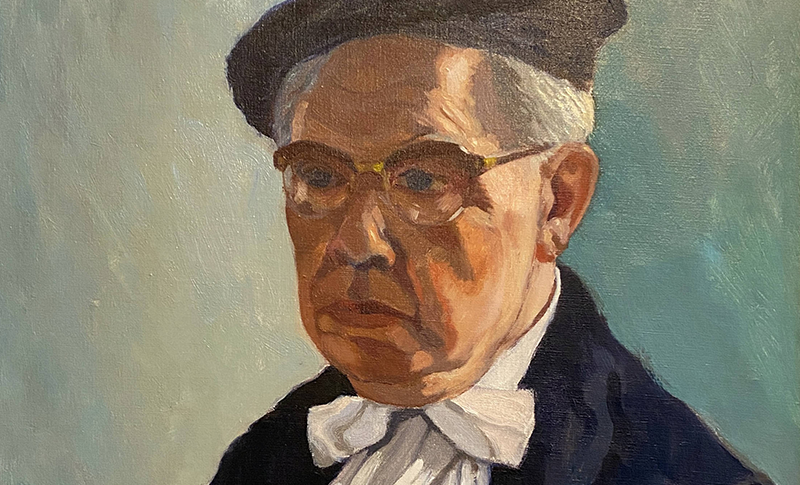A lecturer who can say they´re a professor, be a supervisor and wear a toga? No problem at the TU/e in Eindhoven. Their colleagues at Wageningen think WUR ought to follow that example.
The TU/e suddenly acquired hundreds more professors on 1 November last year. The number quadrupled. Not because the researchers were suddenly promoted en masse to full professorships, but because the university’s Everyone´s a professor initiative took effect then. That brought to fruition the wish of the Eindhoven professor Kees Storm, expressed in his inaugural lecture in 2018.
Storm’s Everyone’s a professor initiative aims to modernize the Dutch academic world and make it less hierarchical, and above all to align it better with the norms in neighbouring countries. A central point is what is known as ius promovendi (supervision rights): being entitled to act as a supervisor, independently guiding a PhD candidate and helping them reach the finishing line. In the Netherlands, that right was reserved until recently for professors. They handle the supervision of PhD projects whereas the co-supervisors – largely assistant professors and associate professors – generally deal with the day-to-day guidance. Since 2017, the law has given scope to deviate from this rule, though. Storm’s attack on system was well timed. The idea has simmered away at universities since then.
Equality
In Wageningen, Ellen Van Loo and Frederic Ang are fervent proponents of expanding supervision rights. Van Loo is and associate professor in Marketing and Consumer Behaviour and Ang in Business Economics. Both have Belgian backgrounds. It is no coincidence that they in particular want the topic on the agenda at WUR. ‘In Belgium, every lecturer and associate professor can call themselves a professor too,’ says Van Loo. ‘But that term is merely one aspect of showing that you’re an expert in your field: it’s about the hierarchical structure that needs changing. Everyone’s a professor is about equality, recognition and the rights that go with the obligations. It´s about responsibilities that are commensurate with what you do.’
‘I’ve worked in England and Belgium,’ says Ang, ‘where a tenure tracker has supervision rights virtually from day one. And that matters a lot. As a tenure tracker, the idea is that you should be building up your own independent profile as a scientist. Supervising a PhD candidate is a significant part of that. The system in Wageningen splits the supervision rights from the guidance, though: you have to do the latter, but only a professor can be a supervisor. That makes it all heavily dependent on the professor, which runs counter to the desired independence.’
‘The everyday guidance in a PhD project is quite an obligation and it can be intensive,’ adds Van Loo, ‘so why shouldn’t it come with supervision rights? The responsibilities and the rights don’t match.’
Rules
The two Belgians’ arguments are backed up in part by Wageningen Young Academy, the group of younger tenure trackers. ‘The way supervision rights currently work creates a lengthy and sometimes very unnatural dependency relationship between the younger and the older and more experienced researchers in supervising PhD candidates,’ says Nico Claassens, associate professor at the Laboratory of Microbiology. ‘Despite often having the idea for a project, bringing in the funding and doing most of the guidance, you have to bring someone else on board because you don’t have supervision rights. That feels wrong. Not just for us, doing the supervision, but for the PhD candidate too. I have one PhD student who has two experienced coaches who don’t have supervision rights. Even the supervisor asked, “What do you need me for? I’ve hardly got anything else to do with this research.” Well, those are the rules… Not that it’s always like that, of course. There are plenty of supervisors who bring a lot to the table. And in some cases it’s really good to have a supervisory team with a wide range of skills. It’s about being obliged to do it a particular way.’
It’s the candidate who suffers if you get it wrong
‘It’s about the pool of people with supervision rights being too small,’ says Tim van Emmerik, an associate professor of Hydrology and Environmental Hydraulics. ‘In Wageningen, day-to-day supervision of PhD candidates is done by at least two people and ideally, one of them would have supervision rights. We have to make that pool bigger and develop a good system to ensure that, independently of your place on the academic ladder.’
Accountabilities
Everyone’s a professor has been bubbling away in Dutch academic circles for some time, since the Young Academy embraced the idea of Eindhoven’s Prof. Storm two years ago. In Wageningen, it is on the agenda of the Academic Board, says Dean of Research Wouter Hendriks. The Academic Board advises the governing board about inter alia PhD candidacy matters. ‘Opinions about Everyone’s a professor in the Academic Board are divided,’ says Hendriks. Personally, he is against expanding supervision rights further, beyond what has already been done (see inset). That allows someone in the last phase of tenure track to be a supervisor, or even one phase earlier in special cases. They must then have seen at least three complete PhD projects through as a co-supervisor to acquire the experience. ‘Our Academic Board thinks it’s a big responsibility,’ explains Hendriks. ‘That´s why that rule about three supervision projects was made. Guiding a PhD candidate is quite an onerous responsibility. You take it on for four years, guiding a PhD candidate in becoming an independent scientist. You’ve got to take it seriously. Supervision rights are about more than guiding a PhD candidate; it’s the candidate who suffers if you get it wrong. If there are problems and the project overruns by a year, who pays? The supervisor is responsible and you’ll have to get it sorted. Are you up to that? Do you have the resources, the network or the capabilities? An assistant or associate professor often has fewer options for finding solutions. So you end up knocking on a professor’s door anyway.’
In Belgium, Germany, the UK and the USA, they seem confident you’re capable
Ang and Van Loo think it is weird to link supervision rights to a minimum number of PhD projects managed. Van Loo: ‘A tenure tracker mostly has plenty of experience with writing articles, setting up research and supervising students. I don’t see the guidance as a problem.’ Ang: ‘You also have to look at it in the international context. In Belgium, Germany, the UK and the USA, they seem confident that you’re capable of supervising others from the start of the tenure track. Are the differences between assistant, associate and full professors big enough that you arbitrarily assign supervision rights to a restricted group? I don’t think so. Belgium is a good example of how it can be done without that unnecessary hierarchy.’
Wageningen Young Academy is making the case for having a broadly based committee examine the current system critically. ‘A letter about that was sent to the governing board in June 2023,’ says Claassens. According to him, that committee should include not only professors but also PhD candidates, tenure trackers and other academic staff. ‘As yet, there´s been no response to the request.’
Expansion
Since 2018, both associate and full professors have been able to act as supervisors at WUR. To show they are competent to do so, the former must have guided at least three PhD projects in Wageningen. Within the new Academic Career Framework, that is a requirement for reaching the last tenure track phase before promotion to a full professorship. Three years ago, around a hundred associate professors at WUR had supervision rights. How often they actually took on the supervisory role last year is not known. There was one PhD graduation in December that did not involve any professors: neither the supervisor, the co-supervisors nor the opponents were full professors. Some assistant professors have also recently become able to request supervision rights. The same requirement of at least three PhD projects supervised applies.
Toga
In Wageningen, the right to wear a toga is reserved for professors. The rules are more flexible elsewhere in the Netherlands. Since November last year, all Eindhoven’s academic staff have been allowed to wear togas at formal ceremonies. Despite that, sources at the toga maker say business is quiet. In Nijmegen and Utrecht, not only the supervisors but also the co-supervisors are allowed to wear togas at the graduation. Elsewhere, the rules vary. The opinions at Wageningen Young Academy are divided, says Nico Claassens. ‘Some see only the professors being allowed to wear a toga as a sign of inequality. It’s about what the toga represents: does it symbolize status and hierarchy, or the neutrality of science? If you’re in the latter camp, it’s strange that only the professors have togas.’

 Photo Guy Ackermans
Photo Guy Ackermans 
Great article! I do think the translation to English here is a bit ambiguous: promotor is not equivalent to “supervisor”, in fact that is the main argument made by the interviewees: co-promoters or daily supervisors often do the bulk of the supervision and hence are the main “supervisors” yet get a smaller role in the final promotion. The latter is reserved for the promotor. I think the word supervisor should consistently be replaced with promotor in this article in order to be correct
While I agree with much what has been said, I also have experienced that one of the more difficult elements of guiding a PhD to a successful conclusion lies in the supervisory team guiding the dissertation to a coherent portfolio of chapters that together is more than the sum of the parts. This requires integration and reflection that goes beyond supervision of individual papers / chapters or MSc theses. Reserving the Ius Promovendi to supervisors who successfully supervised a fair number (e.g. three mentioned above) PhD dissertations, provides some guarantees that there is always someone in the supervisory team who has been involved in getting that part of the PhD trajectory up to good standards. I was really glad to learn this from having experienced full professors on board for the first couple of PhD candidates I had the honour to supervise.